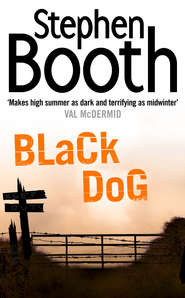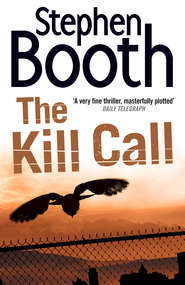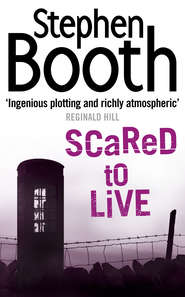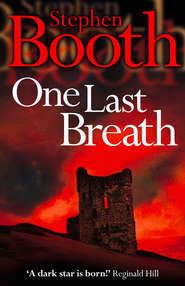По всем вопросам обращайтесь на: info@litportal.ru
(©) 2003-2024.
✖
Cooper and Fry Crime Fiction Series Books 1-3: Black Dog, Dancing With the Virgins, Blood on the Tongue
Автор
Год написания книги
2018
Настройки чтения
Размер шрифта
Высота строк
Поля
Ben Cooper didn’t quite know what to make of Harry Dickinson. Usually he could read some emotion in people he came into contact with in this sort of job. They were often upset, frightened, angry or even completely knocked for six by shock and distress. These were the ones for whom violent crime was something new and horrific that had never touched their lives before. Sometimes there were those who were nervous, or became unreasonably aggressive. Those were interesting reactions, too, often the first signs of guilt. He had learned to pick up those signs in the people he dealt with. He thought of it as a good detective’s instinct.
Harry Dickinson, though, had showed no emotion of any kind, not when he had been in the cottage with his wife and granddaughter, and not now when he stood with Cooper at the spot where he and his dog had found the bloodstained trainer.
During the walk down the path to the foot of Raven’s Side, Harry had marched ahead, silent and stiff, his back pulled straight, his arms swinging in a steady rhythm. He had not spoken a word since they had left the cottage, communicating only with a slight tilt of the head when they reached a turning in the path. It was as if the old man was shut up tight in a body that had turned to wood. Cooper would have liked to have got in front of him, to try to read something in the old man’s eyes.
‘You do realize that Laura Vernon might be lying nearby badly injured, Mr Dickinson?’
‘Yes.’
‘Or even dead?’
Harry met Cooper’s eyes. What was the expression that passed across them so fleetingly? Amusement? No, mockery. An impatience with such a waste of words.
‘I’m not daft. I know what’s what.’
‘It’s vital that we know the exact spot you found the trainer, Mr Dickinson.’
Harry spat into the grass, narrowed his eyes against the low sun, like an Indian picking up a trail. He pointed the peak of his cap to the right.
‘Down there? Near the stream?’
‘Jess runs down there, by the water,’ said Harry.
‘What’s past those rocks?’
‘A wild bit, all overgrown. There’s rabbits and such in there.’
‘Is that where the trainer came from?’
Harry shrugged. ‘Take a look for yourself, lad.’
Cooper walked over to the outcrop of rocks. Only their tops protruded from the grass, and their jagged shapes looked slippery and treacherous. It was not a place he would choose to walk over, given the choice of easier walking that lay in other directions. He could see that sheep must graze here, by the shortness of the coarse grass. Between the rocks, narrow tracks had been worn, and there were ancient black pellets drying on the ground.
Trying to stick to the rocks to avoid confusing any traces of footprints, Cooper clambered over into the thick undergrowth. The stream rushed over the rocks a few feet to his right, running low just here below a stretch of smooth, grassy bank. It looked like an ideal spot for two people to spend an afternoon, secluded and undisturbed.
He looked back over his shoulder. Harry Dickinson had not followed him. He stood on a flat section of rock, poised as if guarding the path, apparently oblivious to what was going on around him. His fist clenched occasionally, as if he felt that he ought to have his dog lead in his hand. He looked completely calm.
Cooper moved further into the undergrowth, his clothes brushing against the bracken and catching on the straggling tendrils of brambles. Two or three wasps, disturbed by his passage, hovered round his head, making irritating darts at his face and evading his futile slaps at the air. The trees began to close over him again, creating a dark cave filled with summer flies.
Ahead and about thirty feet below, just across the stream, he could make out a wide footpath marked with small stones and with wooden ledges built into the ground as steps. It was almost a motorway of a footpath, cleared of vegetation, well-used and worn by many feet. Cooper realized that he had almost reached the Eden Valley Trail, the path that connected to the long-distance Pennine Way a little to the north. It was a favourite with ramblers, who passed this way in their thousands in the summer.
But the spot where he stood was as remote and isolated from life on the path down there as if it had been on top of Mam Tor itself. A passing walker would not have been able to see Cooper up there among the bracken, even if he had bothered to look up.
He turned round, wafting his hand across his face against the flies. He was looking back through the trees and thick brambles as if towards the end of a dark tunnel, where the figure of Harry Dickinson stood framed in a network of grasping branches. Cooper had to squint against the contrast of a patch of dazzling light that soaked the hillside in strong colours. The old man stood in the glare of the low sun, with the hot rocks shimmering around him like a furnace. The haze of heat rising from the ground made his dark outline blur and writhe, as if he were dancing a slow shimmy. His vast shadow, flung across the rocks, seemed to wriggle and jerk as its jagged shape fragmented among the bracken and brambles.
The expression in Harry’s eyes was unreadable, his face lying partly in the shade from the peak of his cap. Cooper couldn’t even tell which way he was looking, whether he had turned away or was staring directly towards him into the trees.
He wanted to grab the old man by the shoulders and shake him. He wanted to tell him that somebody had disturbed the spot, and recently. The evidence was right there for anyone to see and to smell. There had been two people, and at least one of them had been looking for more than just rabbits. The smell that lingered under the trees was of stale blood, overripe meat and urine. And the flies had found something even more attractive than Cooper’s sweat to feed on.
5 (#ulink_2e621694-6125-55ab-a9a1-ff9770f83448)
‘OK. Secured?’
‘Officers at all points,’ said Hitchens promptly.
‘Scenes?’
‘On their way.’
Diane Fry stood behind DI Hitchens and Detective Chief Inspector Tailby, twenty feet from where the body of the girl lay. The scene had already been well-organized. Hitchens had made a big performance of it, posting officers along the track, calling for information so that he could pass it on to the DCI. But it had seemed to Fry that everything necessary had already been done even before Hitchens had arrived.
‘Scientific support?’
‘Ditto.’
‘Incident room?’
‘DI Baxter is i/c.’
Tailby was head and shoulders taller than the inspector, slim and slightly stooped around the shoulders, as very tall men often were. His hair was greying at the front but still dark at the back, and it was left to grow thicker than the cropped heads favoured by most of his junior colleagues. He was wearing green wellingtons, which were not ideal footwear for stumbling over half a mile of rough ground scattered with rabbit holes and hidden stones. He was lucky to have reached the scene without a broken ankle. Fry congratulated herself on her habit of wearing strong, flat-soled shoes and trousers.
‘Photographer?’ said Tailby.
‘Here, ready.’
‘Let him get on with it.’
Fry waited for the DCI to ask about the doctor, but she looked up and realized that he could already see Dr Inglefield making his way down the path.
‘Finder?’ said Tailby.
‘Back at the cottage, sir. With DC Cooper.’
‘Let’s see what the doc says then.’
The doctor was giving his name to a PC standing halfway up the path. Tailby waited impatiently while they compared watches to agree the time, and the PC wrote it down in his notebook. Most of the other officers who had inevitably begun to gather round the scene had been sent away to continue their search, grumbling all the more at the futility of it.
Blue and white tape hung in strands for several yards around the body, wound round the trunks of trees and a jutting stump of black rock. From where the detectives stood, all that could be seen of Laura Vernon was a lower leg. The black fabric of her jeans contrasted with the glare of a white, naked foot, its toenails painted blood-red. The rest of the body was hidden in a dense clump of bracken, and around it there were numerous signs of trampling. Fry knew that the broken stems and crushed grass raised the odds in favour of the crime scene examiners producing the sort of evidence that would lead to a quick arrest. She longed to get nearer, to get a close look at the body, to see the girl’s face. How had she died? Had she been strangled or battered, or what? Nobody was saying. At this stage, nobody wanted to commit themselves. They simply stood and watched the doctor do his official business as he nodded at the policemen without a word and made his way gingerly along a marked-out strip of ground to the crushed bracken.
They were, of course, assuming the body was that of Laura Vernon. There seemed little doubt, but it was not considered a fact until one of her parents had been dragged through the process of identification.
‘No hope of getting the caravan down here,’ said Tailby.
‘Nowhere near, sir,’ agreed Hitchens.
‘Is there a farm track nearby? What’s over that side of the trees?’
‘Don’t know, sir.’











